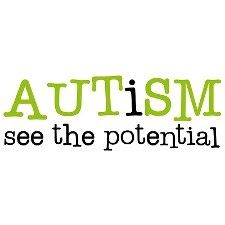There’s an invisibility shrouding autism that I see vividly, as if in neon lights, so evident is it.
People will themselves to perceive anything but autism. Whether through well meaning, a fear of difference, or simple (and maybe most often) unawareness. I will myself to always use my autism viewfinder, and usually spot a symptom, reason or peculiarity that forms a line, bold or dotted, back to the condition – so embedded in its world am I.
What I am witnessing now in my 21 month old daughter, Tabitha, seemingly on a typical developmental trajectory, emphasizes the functioning of a toddler without autism versus one with. She points at things, babbles back and forth with me. She waves and plays appropriately, with imagination, impetus and meaning. Tea parties, pottering around, blowing kisses, feeding dolls. She seeks interaction and play with other children. My, she gains my attention – and in a confident, communicative manner (some would say diva-ish). She shows a powerful instinct and intuition for moving around, responding, creating, learning.
There’s a loud and clear, forever hovering, question mark around her speech, or lack of it though. She’s sort of making out words, sounds and syllables. But probably not whole words. The nagging concerns around this single developmental drag remain just that. Just. I’m sure people in our situation seek out questions where answers aren’t needed or don’t even exist. And the reality I’m anchored to is that so, so much of what she does do, Isaac didn’t at a similar age.
In those early years then, whilst I saw all what was atypical and was silently alarmed, autism awareness wasn’t there to provide me with any sort of solution. Not till his diagnosis just after his third birthday. More telling, I believe others – friends, family, professionals – perhaps saw very little in the little he was doing; unrelated ‘delays’, toddler tantrums, maybe indiscipline, rogue parenting.
Because what was the most potent display of this alternative, different, disturbing (to me) behaviour? Simple upset. Tabitha’s tears don’t tear through me like Isaac’s always did (and on occasion, still do. Not being prepared for a haircut. A disruption to routine. Autism’s sting always lurks). And therein lies the subtlety. People don’t analyse tears and anger. After all, they just appear to be, well, tears and anger.
When Tabitha cries not wanting to get off a train, or let go of a toy, the toddler tears subside rapidly. In similar occasions Isaac wept and wept and screeched and shouted. His despair was dogged.
Fast forward to now and of course the intense intervention – speech and language, the one on one at school, life skills and more – Isaac has been subjected to, coordinated with comprehensive home parental ‘work’ (my wife the unsung, utter hero here), has set him on a journey where his behaviour and interactions bear little resemblance to those early deficiencies. However it’s not that he’s simply caught up or performs tasks typically – not when you delve and decipher, peering behind the person, assessing the actions.
What has come naturally to Tabitha, took, and can still take, painstaking endeavour and laborious learning for Isaac. Even now her holding of a pen or cutlery, physical gestures, reciprocal cues and more come easier and more fluidly for this little girl. Compared to Isaac’s heavy, laden, elaborate approach – remembering to share, comprehending the definition of it, why it’s a good, nice thing to do; moving his hand back and forth as it signals hello or goodbye. The defaults for Isaac are so unspontaneous, everything needs accurate recall, industry, an all-encompassing literal-ness that can be construed as one dimensional. That’s before accounting for the myriad sensory processing challenges and absolute engrained commitment to memorising, parrot fashion learning of every speck of detail, important or not, and of course, repetitive (not productive) play. It’s all so burdensome.
Someone with autism (and by proxy, family members) experiences life to the extreme, its daily ups and downs. Autism quite often feels like life on the edge. Mundane and maddening often, but on the edge nevertheless. Outside the norm. Marginalised. Unregulated, uncomfortable, unstuck. Envious and enraged on the bad days.
Maybe people are uncomfortable, or more probably, unaware of this and seek to smooth out. Making invisibility of the condition as glaringly visible to me as it’s always been:
Isaac’s acute anxiety means hearing a firework can trigger impossible-to-sedate fear at bedtime. But all kids get a bit frightened at night, right? Perhaps not to the extent that obsessing over Firework night runs well into March and beyond. Regularly enforcing that next ‘November I’ll sleep with mummy and daddy’’ and that each night imploring me to say, identically to yesterday that ‘no, there won’t be fireworks’, and ‘if there are, I won’t see them?’. Over and over and over again.
What about love for train leaflets and maps (identical, similar, functional, whatever); the need to possess and pore over. Surely lots of boys collect and catalogue stuff, don’t they? Maybe, but not when that hunger for hoarding cannot, will not, be sated, masking a deeper, more traumatic struggle with the world. Pinpointing Oyster contactless payment leaflets at stations and demanding I take 20 – that he already has – can lead to calm and a transient contentment. But the paraphernalia rapidly turns to a crutch, joining the untouchable hundreds that populate his room. Inanimate but perilous, should they vanish from his watch.
To say haircuts were my least preferred of enforced chores as a 7 year old would be an understatement. To say I hated them wouldn’t. But that’s absolutely not to say they were harrowing like they clearly are for Isaac. The feeling of circus knives scraping his scalp and bright lights blinding his eyes. Gaudy mirrors, nightmares from the last horrific haircut swirling. A scraped neck because of the hairdresser’s inability to control his angry, enraged body contortions. And worse of all, afterwards; hairs, swarming and crawling into every nook and cranny of the poor boy’s body. Only changing clothes there and then into new soft fresh ones would suffice.
Food phobias, at times an inability to eat, only eating specific foods in specific locations at specific times. Well, we all know fussy eaters. Not to the extent where hunger can be pretty much bridled thanks to the maelstrom of other irritating, infuriating issues clawing away at him. Hunger almost becomes a controlling comfort for Isaac – I guess.
Indeed, food ensures we have a daily taste of the complexities and conundrums of Isaac’s autism. When he wakes up and even before his usual, daily reciting to me of ‘today’s timetable at school daddy’ is a strangely forlorn ‘my tummy is full, I don’t need breakfast’, what’s imminent is an unleashing of emotion verging – or hurtling into – a breakdown.
His wonky food narrative that distorts and disrupts mainly my wife’s days is increasingly difficult to follow. There are the textural, colour and sensual challenges. There’s also the need to not talk about his lunchtime, odd counterintuitive games, where we mustn’t mention what he’s ate at school. Even if praising for eating something healthy.
In fact, the lunchbox rules are oddly simple, just very tricky to adhere to. We can’t make his lunchbox in front of him and there must be no mention of its contents. At all. It needs to magic itself into his school bag, out of sight, out of mind. If that happens he eats the contents at school, every last bite. If he sees any of it being made and/or any of what’s inside, he refuses to eat it.
The old adage ‘They’ll eat when they’re hungry’ is riddled with falsities. As my wife very cleverly deduced – nerves and anxiety suppress the appetite. However hungry one should be.
There is a flip side to all these behaviours that seem similar to typical children but are so different. The reigned-in ups. Rare but as not as rare as they used to be. His liberated joy when all goes to plan. Like a Sunday session at my spacious workplace. A warming, server-whirring silence. The environment as he expects, calm and sensitive, with people accepting his questioning of names and addresses and nearest stations, adoringly enjoying his descriptions of them as ‘handsome men’ or ‘lovely ladies’. The sometimes bizarre conversation starters, minutiae infused comments, squeezing and infectious physicality can be seen as the eccentric behaviour of a young child (he looks young for 7). For example, his phrasing (‘my eyes are wet’ when he laughs and laughs, ‘will my head come off’ when someone tries to explain ‘open mind’) can make people enchanted by him. But I wonder, is his age a big factor in this generosity of spirit?
There’s an all or nothingness about invisibility and autism. That’s probably to do with age. I imagine a point when he’s older that the invisibility I’ve talked about morphs into something visible, exaggeratedly so. Where all that people see is autism – and in epic proportions.
This is a hunch, I admit. But I suspect a reality thanks to the stats around bullying, exclusion, lack of provision, low educational achievement, poorly trained teachers, homelessness, unemployment, depression and more. Not to mention pure labelling and stereotyping.
I guess a healthy awareness, acceptance and an appreciation of difference is what we can strive for. A young teen at Isaac’s school, when Isaac was bombarding him with odd questions said strangely joyfully ‘this place is weird… it’s probably why I belong here’. It made me smile – a self-aware comment on difference, and why it’s ok.
For now just giving Isaac the tools to balance his behaviour can feel like ploughing through treacle. The effort and endeavour by us and him to display effortless behaviours is monumental. Maybe that’s why what we see clearly, others can’t at all. It’s why only if you’re living with autism 24/7 can you really be exposed to the peculiarities, torment and turbulence. To its shear relentlessness.
Read More










